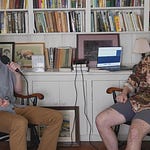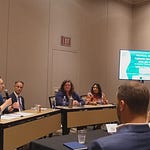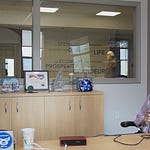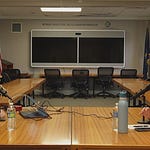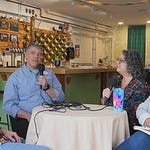This is Bryan.
He believes in freedom.
Not just the kind we talk about, but the kind we create.
At The Freedom Café, Bryan is on a mission to end human trafficking by raising awareness and fostering ethical, sustainable choices—one cup of coffee at a time. For Bryan, combating exploitation isn’t just about policy or protest; it’s about building a community of care, where people gather, learn, and take action together.
The café isn’t just about coffee—it’s a collaborative space where conversations spark change, where every sip supports a movement, and where optimism isn’t just an idea, but a daily practice.
Bryan Bessette is the Co-Founder and Executive Director of the Freedom Cafe. He is a minister, mentor, and advocate, using his platform to challenge injustices and inspire a future where conscious commerce and compassion go hand in hand.
Links & Notes:
This episode was recorded at The Freedom Cafe in Durham, NH
Music provided by Sneaky Miles
Youtube
Episode Summary
What is your connection to New Hampshire?
We have deep roots in New Hampshire. While we have connections to Maine and Vermont, New Hampshire has been central to our journey through education, work, and activism.
How did you become an ordained minister?
We pursued ordination after studying at Plymouth State, followed by a fellowship in Washington, D.C., and further theological training. Our path has been shaped by a desire to support people holistically—physically, mentally, and spiritually.
How does your work connect to activism and social change?
Our focus has always been on building a supportive and interconnected community. Whether through ministry, mentorship, or initiatives like the Freedom Café, we believe in empowering people and tackling systemic issues such as human trafficking.
What is the Freedom Café?
The Freedom Café is a nonprofit coffeehouse dedicated to ending human trafficking and commercial exploitation. It’s also a collaborative space where people gather, learn, and take action on social justice issues.
Why run a café to address human trafficking?
Coffee, chocolate, and sugar are industries known for exploitative labor practices. By creating a space that sources responsibly and educates the public, we can change consumption habits and support ethical businesses.
How big of an issue is human trafficking?
Human trafficking affects over 40 million people worldwide, including cases in all 10 counties of New Hampshire. It includes forced labor, domestic servitude, and commercial sexual exploitation.
What role does community play in addressing human trafficking?
The fight against human trafficking requires a broad coalition—law enforcement, social services, businesses, and individuals—all working together to protect vulnerable populations and create systemic change.
How does the Freedom Café contribute to solutions?
We raise awareness, support survivors, and work alongside the New Hampshire Human Trafficking Collaborative Task Force. Through training programs, public education, and ethical commerce, we help address both the crisis and its root causes.
Has awareness of human trafficking changed over time?
Yes, the conversation has evolved significantly. From the early discussions around sweatshops in the ’90s to modern concerns about labor exploitation in industries like cocoa and textiles, public awareness has grown, and policies are beginning to follow.
What are some tangible signs of progress?
More hospitals now have protocols to identify trafficking victims, every police officer in New Hampshire receives training on trauma-informed responses, and companies are being held accountable for exploitative practices through legal actions and consumer demand.
How do you stay hopeful while working on such a difficult issue?
Hope comes from the progress we see—whether it’s changes in corporate accountability, new laws protecting workers, or the next generation stepping up to create a more just world.
What does optimism mean to you?
Optimism isn’t about ignoring the world’s problems—it’s about recognizing that change is possible. The best way to tackle big issues is by working together and believing that even small actions can make a difference.
What’s next for the Freedom Café?
We will continue building partnerships, advocating for ethical trade, and empowering communities to take action. The goal is to make justice and sustainability the norm, not the exception.
*This episode summary was generated by an AI analyzing a transcript of the interview. The questions, wording, and written meaning of particular sections may contain slight differences to the original conversation. We include these summaries to give listeners a brief, readable synopsis of the episode. The full episode transcript is available on granitegoodness.com.







